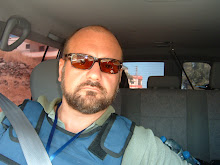 When I visited El Salvador, Guatemala, Honduras and Nicaragua I had the chance to face up the phenomenon of Maras, juvenile gangs, that dramatically affects the security of these and other countries, including some areas of the United States.
When I visited El Salvador, Guatemala, Honduras and Nicaragua I had the chance to face up the phenomenon of Maras, juvenile gangs, that dramatically affects the security of these and other countries, including some areas of the United States.There are entire territories which are under the Maras control, almost impenetrable to low enforcement agencies and regular citizens. When I conducted my RSA in Central America I discovered that to get into that zones, where permitted, a “war tall” (payment of a fee) was requested. It has been reported that those who refused to pay have been killed on site. Originally, the gang's main purpose was to protect Salvadoran immigrants from other, more established gangs of Los Angeles, who were predominantly comprised of Mexicans and African-Americans. For this reason, the gang initially allowed only Salvadorans to join, but later admitted other Central Americans as members. As I exposed in my previous post it might exist a potential collusion between the Maras and international terrorist groups. It should be noted that in 2005, Honduran Security Minister Oscar Alvarez and the President of El Salvador raised alarm by claiming that Al-Qaeda was meeting with one of the most powerful Mara, MS-13 better known as Salvatrucha and other Central American gangs to help them infiltrate the United States. FBI agents said that the U.S. intelligence community and governments of several Central American countries found there is no basis to believe that MS-13 is connected to Al-Qaeda or other Islamic radicals, although there have been security meetings at ministral level within the Central American governments. In the above picture Honduran Special Police stand over Mara Salvatrucha gang members after anti-gang operation in Tegucigalpa, Courtesy Reuters/Roberto Carlos).
During my RSA trip in El Salvador, Guatemala and Honduras the Maras were attacking the bus lines in order to bribe the line owners and bus drivers. Drivers and bus staff were assaulted and, in the worst case scenario killed. The most unfortunate event took place in San Pedro de Sula December 23 2004 when a gunmen opened fire on a overcrowded bus. 28 passengers died, six of those were children. In this case specifically the Mara wanted to send a clear message to the government in order to counterbalance the police successful raids anti gangs. MS-13 now has an estimated 25,000 members in Honduras, El Salvador and other Central American nations. I have been in Honduras in April 2009, just before the military coup and it seems to me that little has been done to resolve the gang security problem.To understand why maras are so popular in Central America we have to dig a little in the socio-cultural context of their members. Maras often represent the only possibility to survive in difficult, poor and violent environments. Children and adolescents living in poor deprived and literally abandoned neighborhoods see the Mara as the only possibility of achieving social recognition. To gain access to the gang an initiation ritual must be successfully completed by the aspirant mareros. They can be involved in selling and smuggling drugs, participate in fighting against opposite gangs or commit homicides. Killing is considered by Mara as “regular procedure”, it represents a success (eliminate enemies, counterparts, policemen and suspects) and a personal accomplishment for the killer.
All Central American governments have in a way or another structured and launched their own programme deemed necessary to violently respond to the Mara long arm. The programme have functioned partially since the governments wanted to reduce the imminent risk posed by the gangs but did not address at all the social-cultural-economic unease which is the base for such criminal illicit outcome. The failure to proper consider the context of unrest and poverty using an immediate armed reaction has shown that governments won the battle but not the war against maras. In other words such approach would suggest the recognition of a larger political failure in terms of lack of public assistance, proper education if any, health cares, etc.
If in the next future the governments of the gang-affected countries will not implement a wider holistic approach to their most vulnerable citizens, assisting and taking care of those less fortunate, the Maras will dramatically continue to increase their capability with an evident repercussion on the life of all citizens and on the security in general.
















1 comment:
Interesting assesment.
Post a Comment